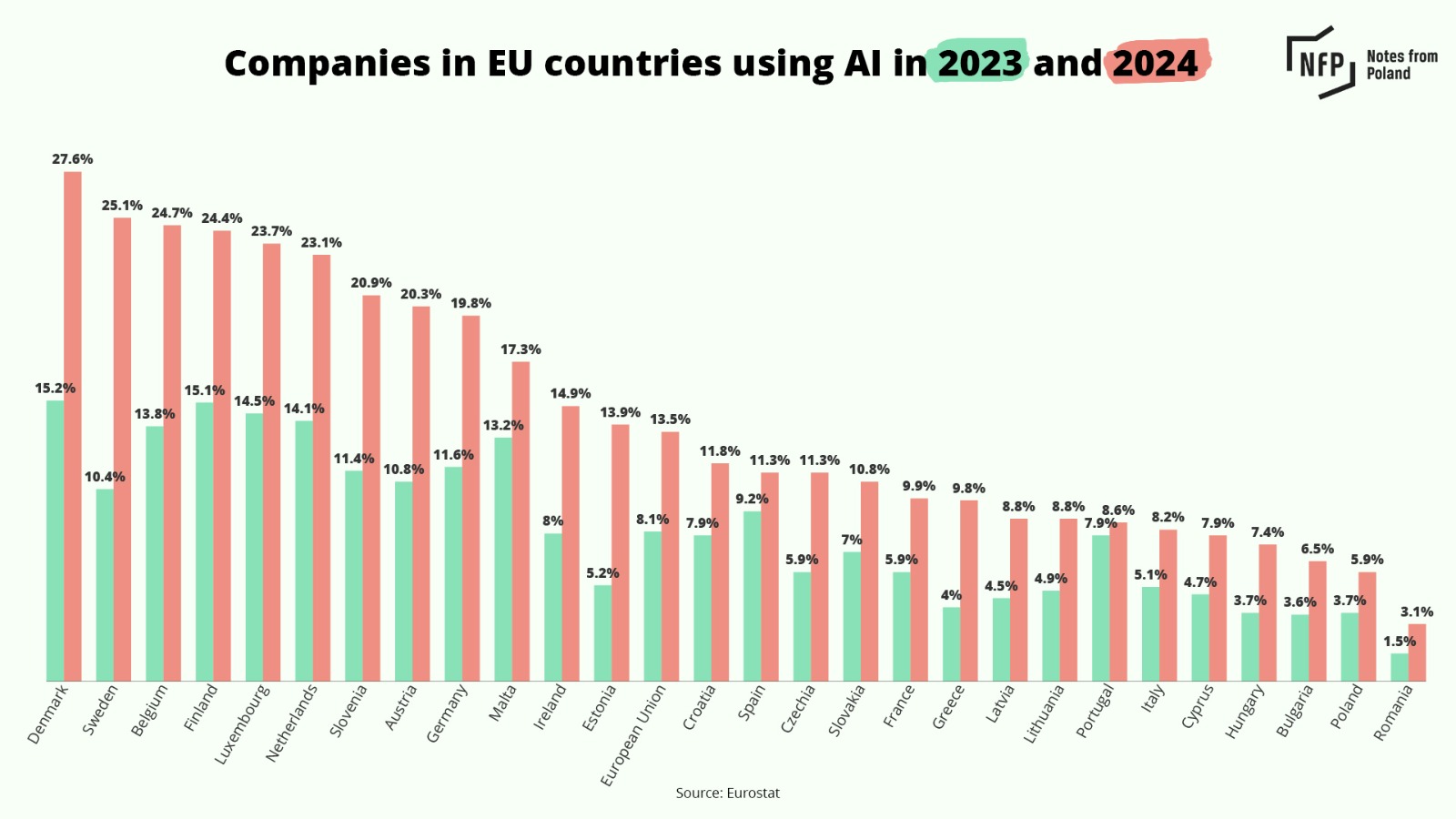Keep our news free from ads and paywalls by making a donation to support our work!

Notes from Poland is run by a small editorial team and is published by an independent, non-profit foundation that is funded through donations from our readers. We cannot do what we do without your support.
Only 5.9% Polish companies are using AI tools, which is the second-lowest figure in the European Union, according to the latest Eurostat data. By contrast, in some EU countries over a quarter of firms use AI.
The figures are highlighted in a new report by the Polish Economic Institute (PIE), a state-linked think tank, which also conducted a supplementary survey of 1,000 Polish firms on their use of AI.
The institute found that more than half of Poland’s micro and small enterprises do not view investment in AI as important, despite these companies accounting for 45.3% of the country’s GDP and over 99% of all businesses.
“These are not optimistic figures in terms of increasing the use of artificial intelligence in businesses,” concluded PIE. “Changing this should be a priority; otherwise, Polish companies may lose market share to faster modernising foreign competitors.”
📢🤖 Premiera nowego raportu PIE!
Sztuczna inteligencja może obniżyć koszty, poprawić jakość i przyspieszyć procesy biznesowe. Jeśli chcemy w pełni wykorzystać jej potencjał, potrzebujemy nowej strategii.
🗞Polski Instytut Ekonomiczny w nowym raporcie „W poszukiwaniu… pic.twitter.com/TbC6uA5UMP
— Polski Instytut Ekonomiczny (@PIE_NET_PL) June 30, 2025
PIE cited Eurostat data released earlier this year, which showed that Polish firms significantly lag behind EU counterparts in adopting digital tools, including AI.
Across the EU, 13.5% of enterprises with ten or more employees reported using AI in 2024, up from 8% in 2023. The highest adoption rates were recorded in Denmark (27.6%), Sweden (25.1%) and Belgium (24.7%). The lowest were in Romania (3.1%), Poland (5.9%) and Bulgaria (6.5%).
All EU member states reported increased AI usage compared with 2023. Sweden saw the largest year-on-year gain, of 14.7 percentage points, followed by Denmark (+12.4 points) and Belgium (+10.9 points). Poland increased its AI usage by just 2.2 points.

PIE’s own research suggests that change is unlikely to come quickly. Its survey found that 55% of micro and small companies described AI investments as “not at all important” or “rather unimportant”, compared with 29% of medium-sized firms and 27% of large firms.
By contrast, 25% of micro firms, 21% of small firms, 35% of medium-sized firms, and 37% of large firms said AI investments were “very important” or “rather important”.
PIE warns that the lack of a coordinated national strategy is holding back AI adoption across the economy, but it acknowledges that the government is in the process of developing it.
In November, the Polish government announced a 1 billion zloty investment in artificial intelligence, including the development of a Polish large language model (LLM), which launched in February. The same month, Poland also signed a memorandum of understanding with Google to establish a “strategic partnership” on AI development.
According to the institute, the most effective approach would be to link AI development with industrial policy and prioritise the development of domestic technologies, thereby reducing reliance on foreign ones.
As part of its recommendations, PIE outlines three possible approaches to shaping that strategy.
The first is a technology stack approach, which focuses on the key components necessary for AI deployment: hardware, network infrastructure, software, and applications. This model aims to map out technological dependencies and identify areas of economic potential.
Google has announced a "strategic partnership" with Poland to develop artificial intelligence.
Poland’s “leadership, ambitions and talents” have “given it a new position in European innovation”, says @Google CEO @sundarpichai https://t.co/ITXWemFZIR
— Notes from Poland 🇵🇱 (@notesfrompoland) February 13, 2025
The second approach involves identifying key sectors of the economy where AI is likely to have the most significant impact.
PIE stresses that AI is a general-purpose technology with the potential to transform virtually all industries. Therefore, decisions on where to prioritise AI development should not be based solely on where the technology can be used, but rather on broader national development goals and industrial policy priorities.
The third recommended approach centres on using AI to address major socio-economic challenges. The institute suggests Poland should first focus on healthcare, energy transition and national security, which are “areas [where] the use of artificial intelligence can bring social and economic benefits”.
Poland’s government has launched a Polish Large Language Model (PLLuM) that is freely available and intended to support the development of AI.
In particular, it will be used to create virtual assistants intended to help provide public services https://t.co/z0gdWkM4OH
— Notes from Poland 🇵🇱 (@notesfrompoland) February 24, 2025

Notes from Poland is run by a small editorial team and published by an independent, non-profit foundation that is funded through donations from our readers. We cannot do what we do without your support.
Main image credit: Emiliano Vittoriosi / Unsplash

Alicja Ptak is deputy editor-in-chief of Notes from Poland and a multimedia journalist. She has written for Clean Energy Wire and The Times, and she hosts her own podcast, The Warsaw Wire, on Poland’s economy and energy sector. She previously worked for Reuters.



















